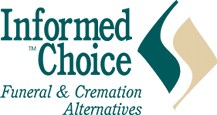Funeral FAQs
Funeral Services Pay Tribute
Like other ceremonies in our lives, a funeral is a rite of passage, an opportunity to recognize the “passing on” of a loved one. It also offers the family and friends the time to share experiences and emotional support and to help one another find closure and adjust emotionally to the loss of an important person in their lives.
The funeral can take many forms, lasting from minutes to days, and is very often influenced by the lifestyle and values of the bereaved family and friends. One suggestion that can help minimize the burden is to consider taking a proactive role (preplanning) and discussing and defining funeral service needs prior to the actual time of need. Preplanning has proven to make the experience less taxing and offers the family the opportunity to spend their energy helping one another emotionally rather than having to use their energy making decisions that could have been made at an earlier, less emotional, time.
What Options Are Available in Services and Disposition?
A valuable aspect of contemporary funerals is their individuality. Whether a ceremony is elaborate or simple, funerals are often individualized to reflect the life of the deceased and to hold special meaning for family and other survivors.
It may reflect the occupation or hobbies of the deceased. It may center around an ethnic background or social affiliation.
In our society, three basic forms of final disposition are practiced:
- Earth burial continues to be the form of disposition chosen most often.
- Cremation – cremated remains are usually placed in an urn which may be buried, placed in a memorial niche, or kept in some other location. Cremated remains may also be scattered in a place of emotional or traditional significance.
- Entombment in a crypt is one of the oldest forms of disposition. Today many cemeteries maintain crypts for entombment which may be in a mausoleum or in an outdoor garden.
What Does a Funeral Director Do?
It has been estimated that over 136 individual activities must take place in order for one funeral to be conducted. The Funeral Director is responsible for ensuring that the family receives professional guidance and care and that the funeral services accurately reflect the wishes of the family in all aspects.
Here is a condensed list of some of the more visible activities of a typical funeral director:
- Remove and transfer the deceased from place of death to Funeral Home
- Provide professional care of the deceased which may include sanitary washing, embalming preparation, restorative art, dressing, hairdressing, casketing and cosmetology
- Conduct a complete consultation with family members to gather necessary information and discuss specific arrangements for a funeral
- File all certificates, permits, affidavits, and authorizations, as may be required
- Acquire a requested amount of certified copies of the death certificate needed to settle the estate of the deceased
- Compile an obituary and place in newspapers of a family’s choice
- Make arrangements with a family’s choice of clergy person, church, music, etc.
- Make arrangements with cemetery, crematory, or other place of disposition
- Provide a register book, prayer cards, funeral folders, and acknowledgments, as requested by a family
- Offer assistance in notifying relatives and friends
- Arrange for clergy honorariums, music, flowers, death certificates, obituaries, additional transportation, etc.
- Provide care and arrangement of floral pieces and post funeral distribution as directed by the family
- Arrange for pallbearers, automobiles, and special services (fraternal or military) as requested by the family
- Care for and preserve all floral cards, mass cards, or other memorial contributions presented to the funeral home
- Direct the funeral, with his/her staff personnel, in a most professional manner, and be in complete charge of the funeral procession to the cemetery or other place of disposition
- Assist the family with social security, veterans insurance, and other death-related claims
- Arrange a post funeral meeting with the family to deliver such things as the register book, floral and mass cards, and to ascertain whether or not he/she can be of further assistance


